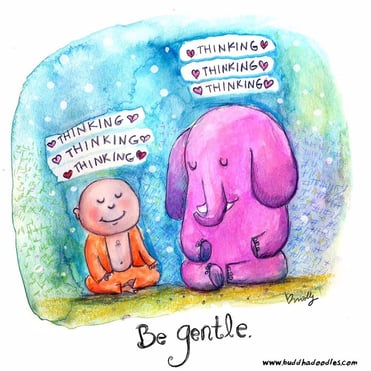This global pandemic, COVID-19, is happening to everyone! Everyone will have some trauma history after living through this crisis. Every child now has at least one point on the ACE score! (Learn more about the ACEs study and its connection to trauma and health.) Everyone needs support to build up their resilience right now, during COVID-19.
If you are already identified as a trauma survivor, pre-pandemic, this health crisis – a threat to safety for all - may be making daily life even more difficult for you. This is difficult for everyone!
Trauma survivors are responding to this crisis in different ways (like everyone else). For some, strong survivor parts of self, that kept them alive through childhood or early trauma, are coming out and trying to lead the way forward. Those parts know how to survive!
For others, they are frozen, their anxiety is triggered, and they feel paralyzed. For many, each day brings out different feelings or parts of themselves. It can be unpredictable. Trauma survivors are feeling further validated in their belief that nothing is safe, and they are waiting for the other shoe to drop.
It’s okay if you’re struggling right now. It’s also okay if you’re not struggling right now! Whichever way you are feeling right now, I want to remind you of these points:
We are all in this together. You are not alone.
You’ve gone through very tough times before. You’ve survived. You realized you wanted to do more than survive life. You sought help to learn how to take care of yourself in healthier ways. You have tools that work for you, and if you need more, you can seek them. You are strong and resilient. We can build up your resilience during COVID-19 together.
Also, this is not the trauma that happened in childhood.
Similarly, to childhood trauma, you may feel powerless. You may feel trapped. But the difference is that you’re not in this alone. This is not a big secret you have been asked to keep. This is not something people won’t understand. Everyone understands! We’re all in this together. If we stay connected, we can heal. There is a healing that comes from knowing you’re not alone, having healthy relationships, and secure attachment.
Together, we can move through this unprecedented time differently than trauma in the past. We can move through this with connection, support, healing, and heightened compassion (for ourselves and others).
I know this is hard. It is also an opportunity to build resilience and continue to heal—because we are all in this together.
Yes, this global pandemic and everything about it may be traumatic. But we need to remember that healing trauma comes from healthy relationships. Relationships that have or are building secure attachment, self-care, and compassion.
If you have a trauma history (or even if you don’t!), here are steps to increase your resilience during COVID-19:
-
Turn towards healthy relationships.
It is extremely important that we maintain our physical distance to keep ourselves, our loved ones, and our communities safe. But socially, we need to foster and nurture connections. Healthy relationships matter. Now more than ever, it’s important to turn to these safe relationships—or reach out to the helpers—in your life. (And if you can, BE a helper to others!)
Healthy bonds calm anxiety and can even slow fight-flight-freeze responses, which are the legacy of trauma. In a safe relationship, we do not need to face our fears alone. We can turn to each other for shared support, strength, and joy.
-
Use social media and technology for connection—not isolation!
I bet some of my clients never thought they would hear me say this! Before COVID-19, I always said connection is stronger in person than via technology. Well, this is a different time—and this IS the best we have, for now, so let’s use it! I do hope that after this, we will return to in-person and live communication—maybe then we will all be more grateful for it!
Phone calls, Zoom chats with friends and family, or following helpful and safe social media channels can create the connection we need. I know video chatting isn’t everyone’s cup of tea—it isn’t my first choice either—but try it. You may have a more positive experience than you expect.
When it comes to social media, keep your boundaries, and remember to do self-care. If you notice a page or a friend, make you feel bad or provokes your anxiety, unfollow! You deserve safety!
-
Remind yourself to feel your feelings.
Whatever feelings may be coming up for you right now are valid. I know that as a trauma survivor, you may think feelings are scary. You may try to avoid them. Allowing yourself to feel them, noticing that you are still okay (even if you feel bad), and then allowing the feelings to pass, will help you process the emotions. Emotions may be running high during this uncertain time!
If you are having flashbacks, remember you have the tools to take care of yourself; here are ten tips to halt flashbacks.
-
Prioritize self-care.
Figure out what self-care is to you. During the hustle and bustle of life, caring for ourselves can sometimes take the back burner. If you have more time to yourself these days, or if you have less time, trying to manage working and parenting— explore what kind of self-care feels good for you. It’s different for everybody!
Everyone needs and deserves self-care and self-compassion! Here’s how to do self-care as a trauma survivor. On this COVID-19 resources page, scroll down for a plethora of activities, support groups, free yoga and meditation, fun things to do, and more.

-
Give yourself—and others—compassion!
Everyone around the world is experiencing this crisis together. Fortunately, compassion is universal. And it’s a powerful tool to heal trauma. Being compassionate is something we are capable of doing. And YES, you deserve your compassion, too! Here’s how to unleash your most compassionate self.
-
Remember, you have choices.
Your choices (and corresponding actions) can make stress worse, or they can make it better. It’s important to check in with yourself and notice if you are really okay with watching all of the news or reading all of the data about COVID-19.
You get to decide how comfortable you are going out and where (supermarkets, walking, etc.) or if you are comfortable ordering in. As an adult, you get to make choices to keep you safe. Here are some tips on how you can reduce the stress you’re feeling right now.
-
Ask for help.
If this time is difficult for you, reach out and ask for help. Whether you find solace in support from a friend, loved one, or therapist, I do not want you to feel alone. There is love and support out there for you. Please, reach out and voice your need. If you need support, a trauma-informed therapist can help.
If you're struggling to build resilience as a trauma survivor, we are here to help with Imago Relationship Workshops and Relationship Therapy. We also have Online Couples Therapy and Online Couples Workshops right now!
Discover more about Imago with our Imago Professional Membership, Imago Professional Facilitators, Imago Professional Training and Imago Educational Webinars.
Connect. Transform. Thrive.
This blog post was written by Robyn Brickel, M.A., LMFT, Clinical Director, Brickel, and Associates, LLC, EMDRIA Certified and Approved Consultant. 
Robyn is a Licensed Marriage and Family Therapist with 20+ years of experience providing psychotherapy, as well as the founder and clinical director of Brickel and Associates, LLC in Alexandria, Virginia. She brings a strengths-based, trauma-informed, systems approach to the treatment of individuals (adolescents and adults), couples, and families. She specializes in trauma, including attachment, dissociation, and addictions, as well as and perinatal mental health.
She works with clients managing a wide range of mood disorders, addictions, trauma, including attachment trauma, self-harm, eating disorders, and other mental health conditions. She also guides clients and clinicians who wish to better understand the impact of trauma on mental health and relationships. She is trained in numerous relational models of practice, including Emotionally Focused Couple Therapy (EFT), the Psychobiological Approach to Couple Therapy (PACT), and Imago therapy. She is a Certified EMDRIA therapist and Approved Consultant. Utilizing all of these tools, along with mindfulness, ego state work, and sensorimotor psychotherapy to provide the best care to her clients. She prides herself on always learning and expanding her knowledge on a daily basis about the intricacies of treating complex trauma and trauma’s impact on perinatal distress.
Read much more about Robyn on her website! She frequently shares insights, resources, and links to mental health news on Facebook and Twitter as well as in her blog at BrickelandAssociates.com.




